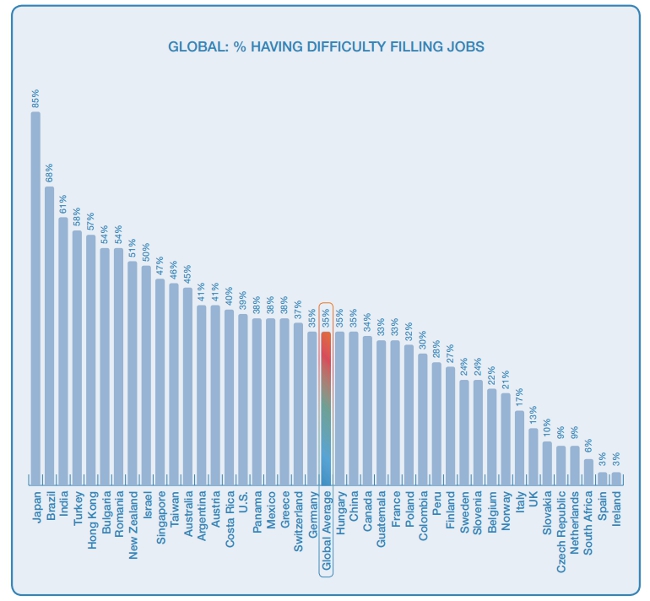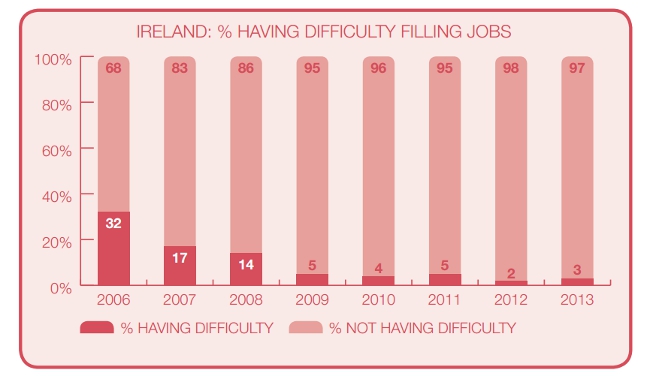The latest Talent Shortage Survey from ManpowerGroup reveals the top 10 jobs employers worldwide are struggling to fill as the global skills gap reaches its highest level in six years. To address this, the global HR consulting firm makes a number of recommendations, which include urging firms to seek out talented women for high-level positions, or risk facing stiff competition from them in future.
Manpowers’ eighth annual Talent Shortage Survey report was released yesterday and compiles statistics from a survey of over 38,000 employers in 42 countries and territories.
The 2013 report states that 35pc of employers worldwide are struggling to fill jobs – the highest level of talent shortage since 2007. The most difficult positions to fill are skilled trade workers, engineers and sales representatives, with technicians and IT staff also making an appearance on the global list.
For the most part (34pc of employers), it’s the lack of technical competencies or hard skills that are preventing employers from filling these jobs, followed by lack of applicants (32pc), lack of experience (24pc), and lack of soft skills (19pc).
The skills shortage is most acute in Japan, where 85pc of employers are having difficulty with recruitment, followed by Brazil (68pc) and India (61pc).

Source: 2013 Talent Shortage Survey Research Results by ManpowerGroup
In Ireland, employers are least likely to suffer, with just 3pc of those surveyed reporting recruitment difficulties.
Over the years since 2006, Ireland’s recruitment woes appear to have dropped greatly. However, this could be a reflection of the recent period of austerity and a lack of recruitment activity.

Source: 2013 Talent Shortage Survey Research Results by ManpowerGroup
Untapped resources
Despite the global recruitment problem, and the fact that the number of employers who believe the skills gap will negatively impact their business has risen by about a third, 22pc of employers surveyed are not adapting to address this talent shortage.
Top 10 jobs employers worldwide are struggling to fill:
1/ Skilled trade workers
2/ Engineers
3/ Sales representatives
4/ Technicians
5/ Accounting and finance staff
6/ Management/executives
7/ IT staff
8/ Drivers
9/ Secretaries, PAs, administrate assistants and office support staff
10/ Labourers
Among other things, ManpowerGroup recommends creating a culture of talent development and tapping into new sources of talent in its follow-up report, The Great Talent Shortage Awakening: Actions to Take for a Sustainable Workforce.
Among these untapped resources: women.
According to the 2013 International Business Report, women make up 50pc of the global population and 35pc of the global workforce. However, among 6,500 companies surveyed, just one-quarter of senior management roles and 19pc of board positions were held by women, and only 14pc of these companies had a female CEO.
The ManpowerGroup report cites research that shows companies with a higher percentage of female officers achieving 34pc higher returns, yet still employers are overlooking the female talent pool.
“Looking at the strategies employers are pursuing to overcome the talent shortage, we see that there is a considerable gap between what employers offer and what women are seeking,” the report says.
Among those employers affected by the skill shortage, only 6pc are redesigning work procedures (such as sharing work assignments), 5pc are offering more flexible work arrangements and just 2pc provide virtual work options.
Top 10 jobs employers in Ireland are struggling to fill:
1/ Skilled trade workers
2/ Engineers
3/ Management/executives
4/ Chefs/cooks
5/ Labourers
6/ Technicians
7/ Drivers
8/ Nurses
9/ Sales managers
10 /Doctors and other non-nursing health professionals
Hire women or prepare to compete with them
The HR consultancy’s report then goes on to warn businesses of the risk they run in ignoring business-minded women. “Those employers who are unconcerned with competing for female talent might instead worry about competing with women for talent,” it reads.
Citing a recent US study, the report tells us that, of only two business segments that added jobs to the economy between 2007 and 2013, one of these was large publicly traded corporations, while the other was privately held majority female-led firms.
“When it comes to women, they will either make a company competitive, or they will become the competition,” the report concludes.
Women Invent Tomorrow is Silicon Republic’s year-long campaign to champion the role of women in science, technology, engineering and maths
Gender equality image via JFunk/Shutterstock




